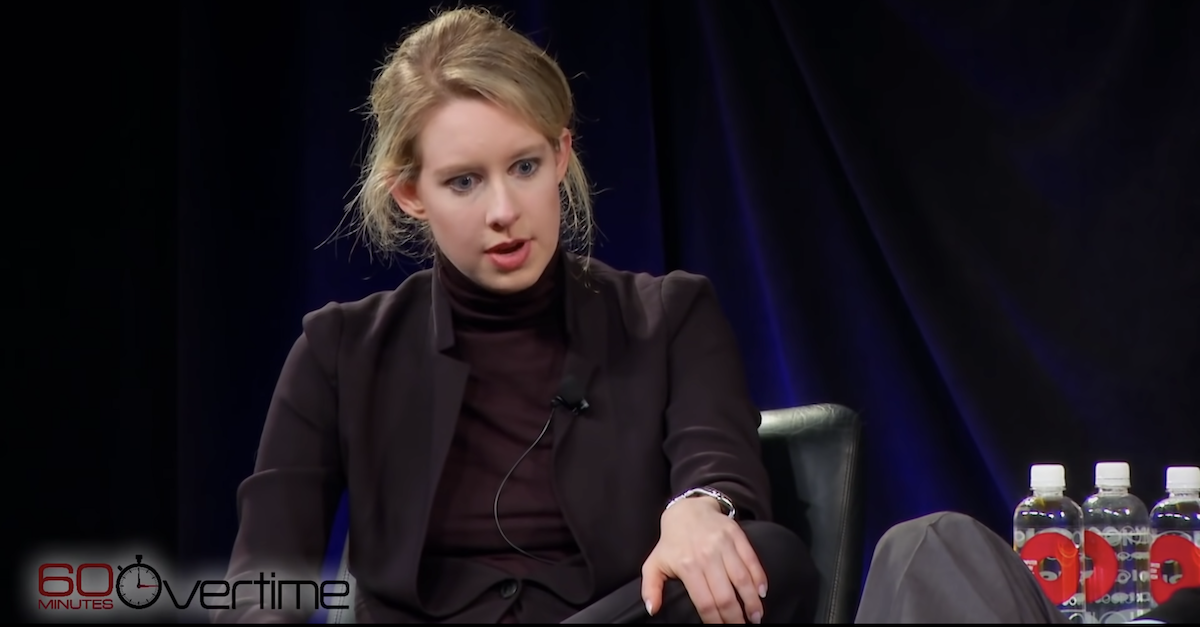
Theranos founder Elizabeth Holmes (screenshot via CBS 60 Minutes)
Theranos founder Elizabeth Holmes is asking for a new trial in her federal wire fraud case, saying a star prosecution witness showed up at her home expressing regret about his testimony and how prosecutors handled the case.
According to a motion filed Tuesday in U.S District Court in San Jose, former Theranos laboratory director Adam Rosendorff told Holmes’ partner, William Evans, during a surprise driveway encounter that prosecutors “made things sounds worse than they were” and asked if he could speak to Holmes because it would be “healing for both himself and Elizabeth to talk.” Evans also said Rosendorff said people at Theranos were “just doing the best they could” and “working so hard to do something good and meaningful.”
“Dr. Rosendorff’s statements reflecting his concerns with the government’s presentation of his trial testimony, along with his comments that bear on Ms. Holmes’ intent, put the integrity of the jury verdict against Ms. Holmes in grave doubt,” according to the 17-page motion. “The Court should grant a new trial or, at the very least, order an evidentiary hearing.”
It’s the latest twist in a case that’s already drawn international attention for its Hollywood-style stars and intrigue, with Holmes enjoying broad media coverage as she persuaded influential people such as media mogul Rupert Murdoch and Oracle founder Larry Ellison to invest in the Theranos as well as some of the U.S’s wealthiest families, including the Waltons of the Walmart empire. Theranos’ board of directors included former U.S. Secretary of State Henry Kissinger and James “Mad Dog” Mattis, the retired four-star Marine Corps general and former defense secretary, as well as famed trial lawyer David Boies, who also represented Holmes and Theranos during the fraudulent fundraising.
A Stanford University dropout, Holmes founded the blood-testing startup at age 19, but federal prosecutors say she and her then-business partner and boyfriend, Ramesh “Sunny” Balwani, went on to defraud investors of millions of dollars with false claims about the company’s capabilities. A jury convicted Holmes of three counts of wire fraud and one counts of conspiracy to commit fraud; another jury then convicted Balwani, whom Holmes has accused of abuse, of two counts of conspiracy and ten counts of wire fraud. His sentencing is scheduled for Nov. 15 while Holmes’ is scheduled for Oct. 17.
After oral argument last Thursday, U.S. District Judge Edward Davilia on Tuesday rejected Holmes’ motion for acquittal, a standard post-trial request brought under Rule 29 of the Federal Rules of Criminal Procedure.
But the allegations about Rosendorff put an entirely new issue before the judge that Holmes’ lawyers say require him to order a new trial under Rule 33, which gives district judges power to grant a new trial that’s broader than the power they have when deciding motions for judgment of acquittal.
“As an initial matter, Dr. Rosendorff’s statements raise the possibility that the government may have engaged in misconduct,” according to the motion from Holmes’ lawyers at the Washington, D.C.-based Williams & Connolly LLP.
Rosendroff arrived at Holmes’ home in California on Aug. 8 about 6:05 p.m. after leaving a 30-second voicemail for Holmes’ lawyer Lance Wade at 4:51 p.m. requesting a meeting with her, according to the motion. Evans said in a sworn declaration that Rosendorff appeared to be in distress, trembling as he spoke haltingly. Holmes and a friend “were in another part of the home bathing our son,” according to the declaration. Evans told Rosendorff to leave, then approached Rosendorff’s car to direct him out of the driveway when Rosendorff spoke to him again.
“He stated that ‘he fe[lt] guilty’ and that he ‘felt like he had done something wrong,’ apparently in connection with his testimony in Ms. Holmes’ case,” according to the motion. “He stated that these issues were ‘weighing on him’ and that ‘he was having trouble sleeping.'”
Wade contacted Rosendorff’s attorney and informed him of the phone call; he was told in response “that there was no need […] to return the call,” documents said.
Wade’s name is on Tuesday’s 17-page motion along with Williams & Connolly partners Kevin Downey, Katherine Trefz and signee Amy Mason Saharia.
The attorneys say Rosendorff’s statements amount to newly discovered evidence that wasn’t previously revealed despite Holmes’ lawyers’ attempts to elicit such testimony during Rosendorff’s cross-examination. They cautioned that “the exact meaning” of his statements remains “unclear,” but they said each possible meaning would make the statements material to the case. Even the most conservative interpretation “would have fundamentally changed the jury’s perception of the case,” according to the motion.
“For starters, testimony from a government star witness that the government cherry-picked evidence and/or testimony to make things seem worse than they were would have gravely damaged the reliability of the government’s investigation and presentation of evidence and bolstered Ms. Holmes’ defense,” the lawyers wrote. “And this testimony almost certainly would have diminished the weight the jury would have ascribed to Dr. Rosendorff’s testimony, which the government used to support key elements of its case.”
Federal prosecutors have not yet responded to the motion. A hearing is tentatively scheduled for Oct. 8 at 1:30 p.m. before Judge Davilia in the Northern District of California’s San Jose office.
Read the full motion below:
(Image: screenshot via CBS 60 Minutes)